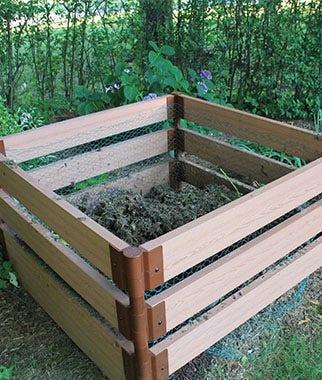We use cookies to give you the best experience on our website. These cookies are completely safe and secure and will never contain any sensitive information. Please read our Privacy Policy. By clicking "Ok" or clicking on any other content, you agree that cookies can be placed.
Easy Fall Composting
The best way to improve any soil is to add organic matter, and in the autumn, the supply of organic matter is unlimited: it's falling from the trees.
Autumn leaves are a main ingredient in compost, nature's own fertilizer. When you work a shovelful of it into the soil, it improves the soil's structure. Spread on top of a flowerbed as mulch, compost helps control weeds and enriches the soil as it breaks down. A thick compost mulch around flowers and shrubs works as insulation to keep the soil temperature even. It also looks beautiful.
"Everybody should try composting, even on a small scale," says Jim Crist, a Kansas City master gardener who built a three-bin compost system in his back yard. "Compost connects me to the whole cycle of decay and growth — that's the spiritual side of gardening. And it smells so good."
Along with autumn leaves, grass clippings and small garden trimmings are all appropriate for a compost heap. Use your lawn mower’s bagging attachment: the last grass clippings and the first autumn leaves, mowed together, make a healthy mix of brown and green material — the carbon (brown) and nitrogen (green) are the principle elements in a compost heap. Any organic matter from the kitchen (broccoli stems, apple cores, potato skins, banana peels, tea bags and coffee grounds, eggshells) is also great in a compost heap. The finer they're chopped up, the faster they will decompose.
You don't need a lot of space to start a compost pile. Look around your garden for a spot about the size of a robust hydrangea: most backyard composters and tumblers are about this size, or you could simply define an area about three feet wide and deep with wire fencing or hardware cloth.
It takes up to a year for a pile of leaves and grass clippings to turn into crumbly compost. You can speed up the process by chopping the ingredients up fine. Turning the heap once a month during the warm season, or every two weeks if you're in a hurry, will also speed things up. Many gardeners are content to wait.
Compost makes soil lighter and easier to dig, and it supports a healthy population of earthworms and beneficial microorganisms. "It's amazing," says Judy Jackson, a master gardener in Kansas City who stockpiles autumn leaves for her compost bin. "I very seldom put any fertilizer on my garden, because my soil is so rich. I just really have great soil now."

